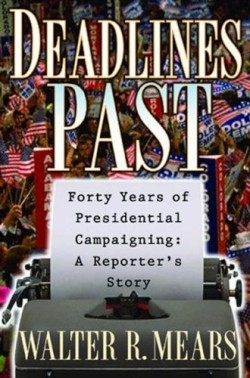
Deadlines Past
Forty Years of Presidential Campaigning: A Reporter's Story
For almost a half-century, beginning in 1955, Walter Mears was a reporter for the Associated Press, and since the memorable 1960 Kennedy-Nixon election he covered every presidential election until his retirement in 2001. Working for the AP wire service differs from working for a newspaper, in that wire service deadlines are constant, with articles due every minute.
Mears is a keen political observer, and his descriptions are as crisp as the reports he filed during his long career. He does not mince words about the candidates. Barry Goldwater was a “loser” whose hapless campaign against Lyndon Johnson in 1964 showed that Goldwater not only knew that he was going to lose but that he wanted to lose. Eugene McCarthy, the antiwar Democratic candidate in 1968, was a “one-dimensional, indifferent candidate,” and Richard Nixon’s 1972 campaign was “as corrupt as the intrigues of a medieval court.” Oddly, Mears ended up on the short list of Nixon’s favorite newsmen.
For his coverage of the 1976 Jimmy Carter-Jerry Ford campaign, Mears received the Pulitzer Prize for national reporting. Carter ran as a self-described outsider, an image that aided his victory but caused him numerous problems, once elected, in working with Democrats in the House and Senate. Ford was doomed because of his pardon of Richard Nixon and later for his uninspired campaign, which led satirist Mark Russell to quip that “when Ford gave a fireside chat the fire went to sleep.” Historians have since come to regard Ford more favorably.
The book is laced with Mears’s biting observations. He describes the 1988 election as being about such “serious issues” as whether George Bush was a “wimp” and Michael Dukakis an “emotionless iceman.” Bill Clinton appears as a “smart, adroit political actor to rival Reagan with a sack of tricks Nixon would have admired.” Ross Perot, the on-again, off-again Reform Party Candidate of the 1992 and 1996 elections, was “as phony as any politician I’d seen.” The book is brimming with anecdotes about the candidates, but unfortunately Mears does not include many details about himself. The reader does not get to know the author, which is too bad because the few personal stories included here add insights into the realms of politics and journalism.
Mears offers some worrisome caveats about the presidential process. He notes that instead of being outlets for unbiased, informative news, the Internet and cable television have become arenas for false accusations, rumor mongering, and opinions posing as facts. Political consultants have made elections even more money-driven than they were, and reporters, themselves, too often are no longer the messenger but part of the message. This is unfortunate, not only for journalism but also for voters who continue to become more alienated by perceived and real political excesses.
Timothy Crouse, author of the classic journalistic account of the 1972 presidential campaign, The Boys on the Bus, offers no small praise: “at what he does, Mears is the best in the goddam world.” The reader will be hard pressed to disagree.
Reviewed by
Karl Helicher
Disclosure: This article is not an endorsement, but a review. The publisher of this book provided free copies of the book to have their book reviewed by a professional reviewer. No fee was paid by the publisher for this review. Foreword Reviews only recommends books that we love. Foreword Magazine, Inc. is disclosing this in accordance with the Federal Trade Commission’s 16 CFR, Part 255.
